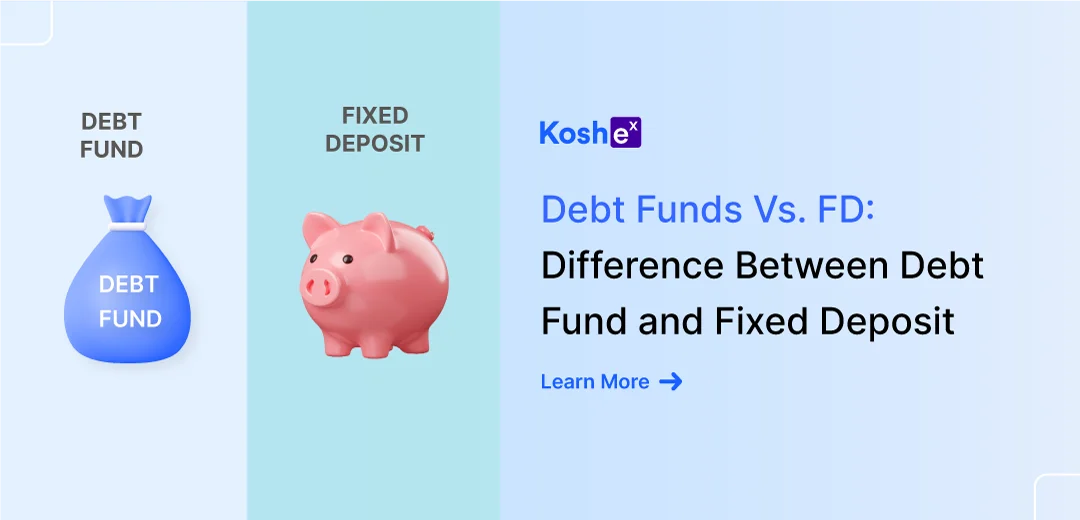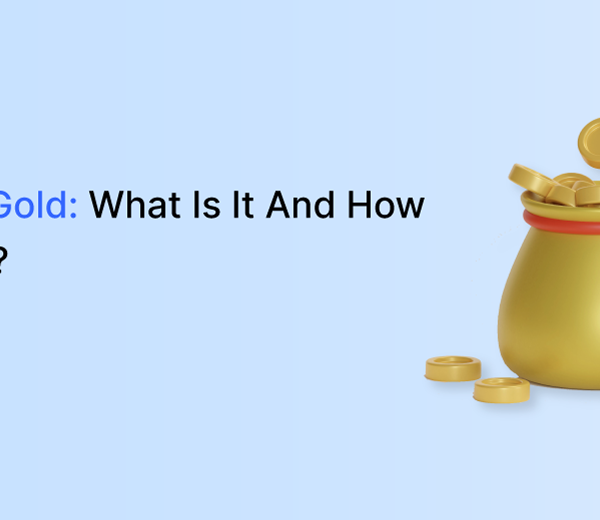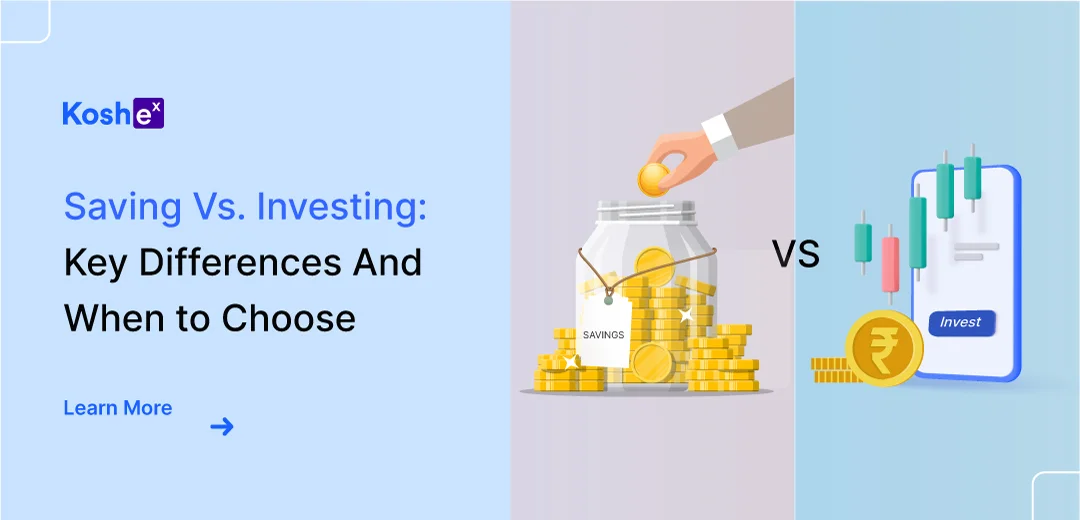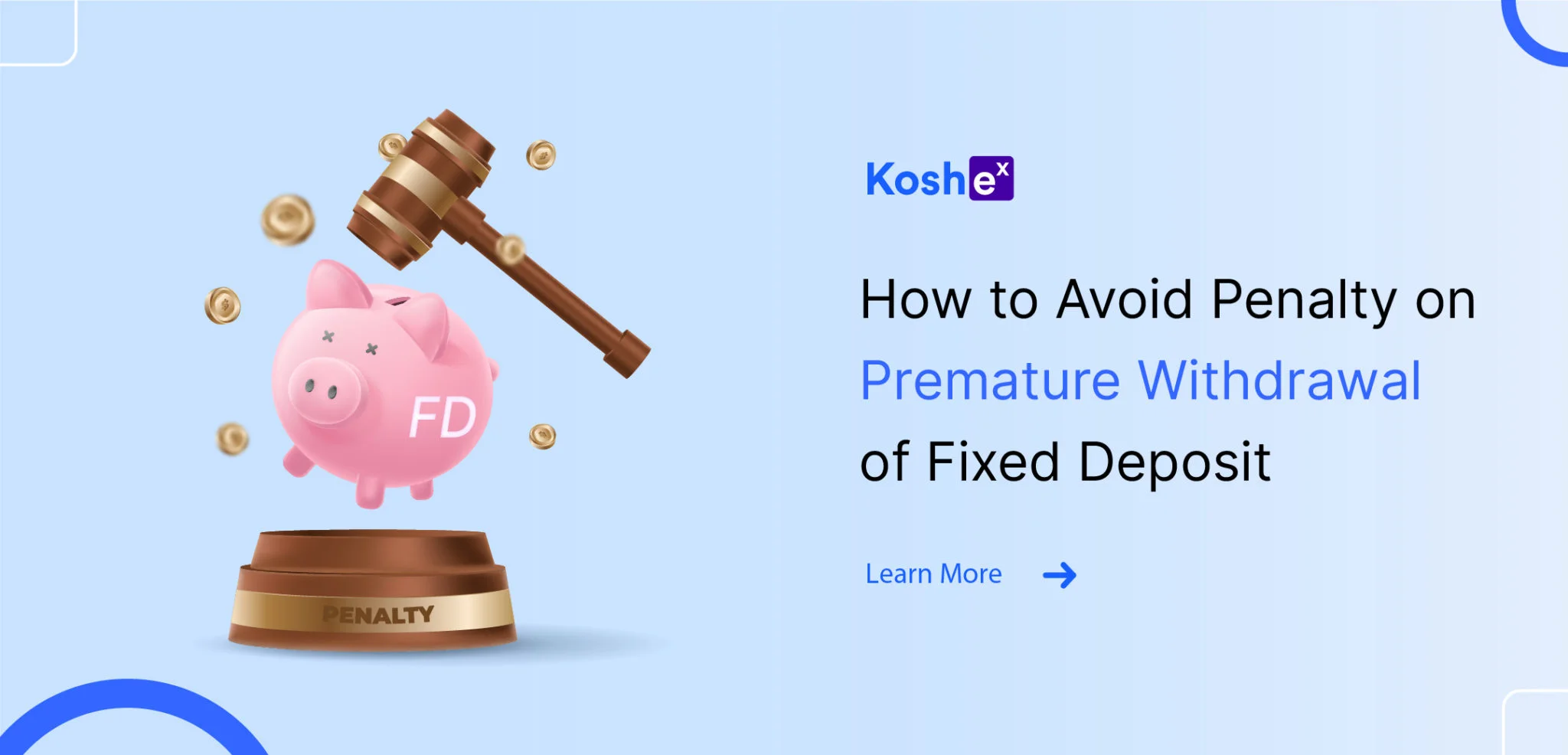Difference Between Debt Fund and Fixed Deposit
If you are an investor who does not like to take risks, the only investment option that may come to your mind is fixed deposits (FDs). The good news is that it’s not the only option available for you.
You can also consider investing your money in a debt fund, a relatively secure investment option that also offers flexibility. In this Debt Fund Vs Fixed Deposit guide, we will look at various aspects of debt funds and compare them to the popular fixed deposits.
Koshex is a behavior-based investment app that studies your financial goals and suggests tailor-made investment solutions suitable for you. Using Koshex can also help you better understand the concepts discussed here. Sign Up with Koshex and explore the app today!
Debt Funds Vs Fixed Deposits
Let’s look at some of the key differences between debt funds and fixed deposits.
FDs As An Investment Option
FDs are investment options where you invest a certain sum with a bank for a fixed tenure, and the bank agrees to pay you FD interest in return. The interest rate is communicated beforehand.
The money is invested for a fixed period and may or may not be withdrawable before the completion of the tenure. Withdrawal before the end of the tenure may be allowed after deducting a premature withdrawal penalty.
You can invest money in an FD for various tenures starting from seven days up to 10 years. Different periods will have different interest rates.
Debt Funds As An Investment Option
A debt fund is a type of mutual fund that invests in money market instruments such as government and corporate bonds, corporate debt securities, and others. The money market is essential to every economy where short-term financial instruments are traded. Debt funds are also known as bond funds or fixed-income funds.
Debt funds provide stable returns, have higher liquidity than FDs, and are reasonably safe compared to mutual funds, which invest in the equity market. Debt funds can be a good choice if you seek regular income without taking any substantial risk. They are tax-efficient and have considerably low volatility as well.
A variety of debt funds are available in the market, some of which are:
Overnight Funds
These funds invest in debt securities with a one-day maturity. This is ideal for investors who want to invest for a very short while. They are considered extremely safe investment options, similar to bank accounts.
Liquid Funds
Liquid funds invest in debt securities with a maturity of up to 91 days. Commercial papers and treasury bills are examples of such debt securities. These funds have a low risk but offer stable returns.
Ultra Short Duration Funds
These funds invest in instruments with a maturity of three to six months. Hence, they are ideal for those looking to invest some amount for the short term.
Low Duration Funds
These funds invest in securities with a maturity of six to 12 months. Since they have a higher maturity period, these funds are considered slightly riskier than ultra-short-duration funds.
Money Market Funds
These are open-ended schemes investing in money market instruments with maturities of up to one year. Typically they invest in commercial papers, treasury bills, etc.
Short Duration Funds
These funds invest in debt securities with a one to three-year maturity period. Typically they invest in government bonds, debentures, corporate bonds, and other similar instruments.
As you can see, different debt funds invest in debt instruments of varying maturity. This can help you invest your funds for various periods based on your investment horizon.
Debt Funds Vs Fixed Deposits
A comparison between debt funds and FDs can be beneficial for you to understand which one is suitable for you:
| Debt Funds | Fixed Deposits | |
| Risk | Low to moderate risk profile. | Ultra-low risk profile. |
| Returns | Depends on the kind of fund invested in. | Depends on the FD interest declared by the bank. |
| Participation in the market | Through debt funds, your money will be invested in debt and money market investment options. | In FDs, you will be investing your money with the bank. You will not be participating in any market directly. |
| Liquidity | High. You can withdraw anytime you want (for open-ended schemes). | Low. It can be prematurely withdrawn after paying a penalty. The bank declares the penalty rate. |
| Cost of withdrawal | Mostly Nil. Some debt funds may have an exit load (0.5% to 2.0%). | Nil if withdrawn on maturity. Premature withdrawal usually attracts premature withdrawal fees of 0.5% to 2%. |
Taxation of Debt Funds Vs Fixed Deposits
To have the full picture, it is important to look at the taxation of both these investment options. Income on FDs is fully taxable. The interest income is added to your total income and taxed at the slab rate (the income tax rate at which your income is taxed).
About debt fund taxation, two terms need to be remembered: short-term capital gains tax or STCG (taxation for withdrawal within 36 months of investment) and long-term capital gains tax or LTCG (taxation for withdrawal post 36 months of investment).
Previously, STCG and LTCG used were different. However, effective 1st April 2023, short-term and long-term capital gains are taxed at the applicable slab rates.
Debt Funds Vs Fixed Deposits The final word
To sum up, it is important to note that debt funds and FDs offer a variety of benefits to investors while keeping the risk factor low. While FDs provide you with the safety and security of a bank, they deprive you of the opportunity to invest in the flourishing money market of India. You may lose out on a considerable opportunity to earn better investment returns.
Debt funds, on the other hand, are versatile, enabling you to invest in various funds based on your investment goals. Whether you want to invest for one day or five years, you always have a debt fund.
But is one better than the other? Well, there is no definite answer to that. FDs and debt funds have a unique place in your portfolio, so you need to strike a balance between the two.
The best way to understand how to allocate your money between these two investment options and which kind of debt fund to go for is by taking the help of a behavioral app such as Koshex to provide you with insights.
You can obtain suggestions from Koshex on suitable investment options by providing inputs about your investment horizon and goals. Sign Up with Koshex and access India’s leading debt funds.
FAQs
Are debt funds better than Fixed Deposits?
Debt funds and FDs are versatile investment options with unique portfolio places. The allocation of funds between the two depends on a person’s investment horizon and goals.
Are debt funds tax-free?
Debt funds are not tax-free. As of 1st April 2023, all debt fund gains are taxed at a slab rate, irrespective of the withdrawal time.









Leave a Comment